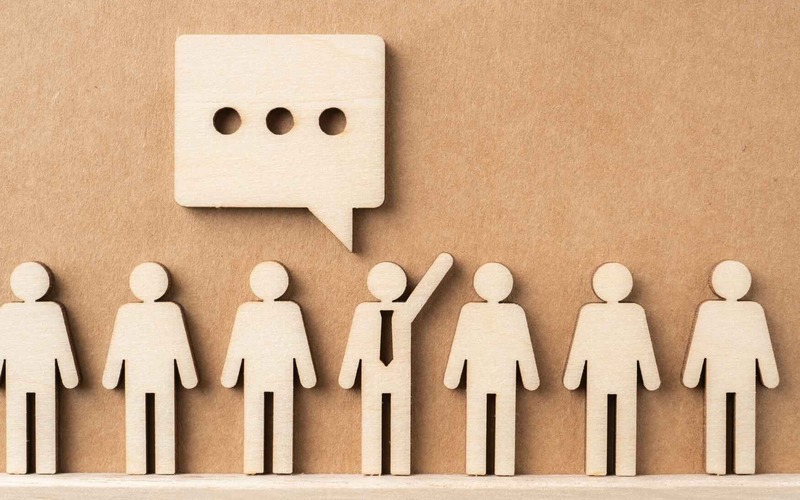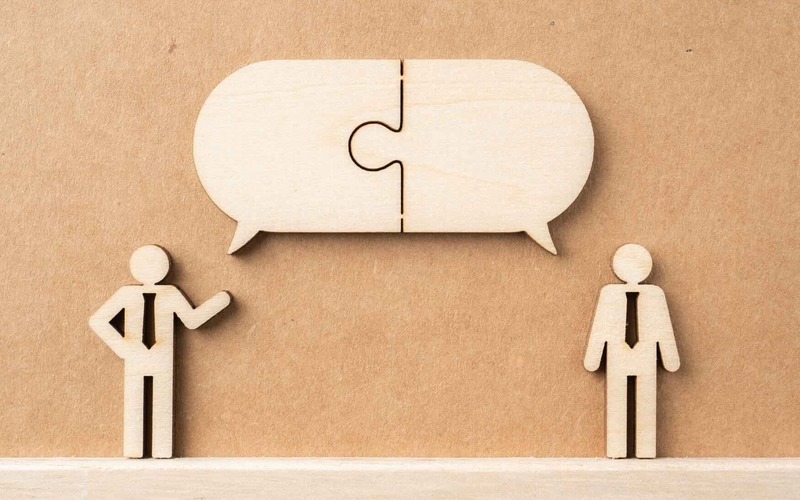The most important communication skill: active listening

If there is one communication skill that you should master quite well, it is undoubtedly listening. Good listening skills lead to greater customer satisfaction, higher productivity, fewer errors and misunderstandings, and a better exchange of information. We don't always think about it, but it's the key to effective communication.
Did you know that professionals spend an average of 70% of their time communicating? Research shows that 45% of this communication goes to listening, 30% to speaking, 16% to reading and 9% to writing. This means that almost half of the time we communicate is spent listening.
It is therefore essential to ensure that you also listen effectively and not only hear what is being said but also understand and apply it. Too often essential and valuable information completely passes us by. This undoubtedly leads to misunderstandings, frustration, lack of clarity and even conflict.
The most simple and powerful way to connect with another person is to listen. Just listening. Perhaps our attention is the most important thing we ever give each other.
Successful leaders and entrepreneurs attribute their success to effective listening skills. Richard Branson often cites listening as one of the most important factors in his success.
Listening or hearing?
Listening is not the same as hearing. Effective listening requires concentration and effort. Listening means paying attention not only to the story, but also to the way it is told, the use of language and voice, and how the other person uses his or her body.
Consequently, listening is not a passive process. The listener must be at least as involved in the process as the speaker. Hence the expression "active listening".
8 tips to sharpen your listening skills
1. Be present
The first step to becoming a better listener is to stop multitasking. We all have busy lives, both at work and away from it. But no conversation goes well if you're listening while tapping away on your laptop or peering at your smartphone. So close that laptop, put your phone on silent and give your conversation partner your respect and your undivided attention.
2. Don't interrupt
Being interrupted is one of the most frustrating obstacles in communication.
It is the biggest pitfall for poor listeners.
When you interrupt the other person, you actually signal that what the other person is saying is not important. That what you have to say is much more interesting and relevant. And that you have no respect or appreciation for what the other has to say. You immediately put a bomb under the communication and thus undermine a constructive conversation.
Extra tip: If you are naturally a fast thinker or speaker, force yourself to slow down so the other person can express themselves. A pause or a few seconds of silence doesn't mean you have to jump in right away. Allowing the other person to speak will also make it easier for you to understand his or her message.
3. Look at the other
Eye contact is an important part of face-to-face conversations. Make eye contact in a relaxed and casual way. It shows that you are paying attention and visually inviting the speaker to talk. Certainly do not stare fixedly at the other person. This can come across as intimidating. It's best to look away occasionally and then make friendly, calm eye contact again. The important thing is that you are attentive.
4. "Listen" to nonverbal cues as well
More than half the impact of communication is through your body language.
The expression on your face, the tone of your voice, your posture and gestures sometimes tell more than what is said in words. So pay close attention to your interlocutor's body language: a smile or defensively crossed arms, it makes a world of difference. Even on the phone, you can hear by the other person's voice whether they are agreeable, suspicious or enthusiastic.
5. Don't jump to conclusions
Be patient. Some people need a little time to get to the point, so don't rush them. Take your time and give the other person the opportunity to formulate his or her message. Also, don't start filling in for the other person. Or think about what you are going to say next. You really can't listen and mentally prepare your own response at the same time.
If you begin to react emotionally to what is being said, it can get in the way of listening to what is being said next. Try to focus on listening. Also, don't assume that you know what is going to be said next.
6. Ask questions
Asking relevant questions shows that you have listened and help to clarify what has been said.
If you're not sure if you understood correctly, wait until the speaker pauses and then say something like "Did you mean that ..." or "Do I understand correctly that ..."
Whenever possible, also use open-ended questions, which begin with who, what, why, when, where, how... Open-ended questions invite the others to tell the full story, they delve deeper and are an incentive to get more information.
7. Paraphrasing and summarizing.
Repeating what has been said shows that you have been paying attention and allows the speaker to correct you if you have not understood. Such as: "Can I summarize as follows..."
Sometimes this process is also called "reflecting": repeating what was said to show that you are on the same wavelength. Especially when it's important, for example a sensitive or complex situation, then effective summarizing can make all the difference in achieving a constructive and successful conversation. Unfortunately, summarizing is still underused and so many conversations end with the people involved having a very different opinion of what was said.
8. Listen with an open mind and show empathy
Listen without judging the other person or mentally criticizing the things you hear. As soon as you begin to judge, you have compromised your effectiveness as a listener. Try to put yourself in the other's place and be open to the other's point of view. Empathy is the heart and soul of effective listening. Showing empathy is not always easy, but it enhances communication and strengthens trust and cooperation like no other.
More information: Communication Skills







